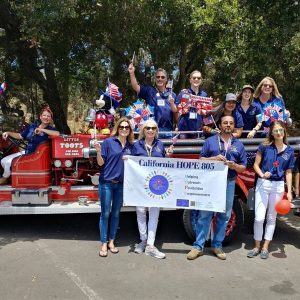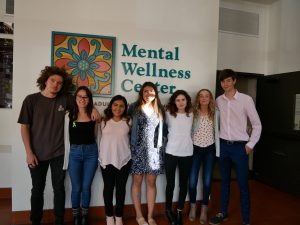BY QUINISHA JACKSON-WRIGHT | APRIL 2, 2019 | LEER EN ESPAÑOL

In the aftermath of the Thomas Fire and 1/9 Debris Flow, residents were confronting many challenges including the physical, mental and emotional impacts of experiencing such a catastrophic series of events. Two collaborative efforts emerged to address the trauma and mental health needs of our communities.
In the heart of Montecito, several organizations worked together to open the Montecito Center for Preparedness, Recovery and Rebuilding. The one-stop center became a hub of helpful resources for residents. This included California HOPE 805, a team of trained professionals created to provide emotional support to those who needed it.
“We quickly figured out that no one was immune from the trauma of what our community had experienced,” remembered Annmarie Cameron, CEO of the Mental Wellness Center (MWC). “Every day became an opportunity to offer comfort, care and normalizing the post-disaster experience to everyone we encountered.”
Funded through the Federal Emergency Management Agency (FEMA), California HOPE 805 addresses the needs of those directly or indirectly affected by the disasters, through a series of outreach efforts, including education, crisis counseling, and resource referrals.
At the same time that the Montecito Center was established, the Community Wellness Team came together weekly to create a wide reaching response to the community mental health needs. Fourteen organizations participated, including the MWC, Cottage Health, Santa Barbara County Department of Behavioral Wellness, Institute for Collective Trauma and Growth, Santa Barbara Response Network, Hospice of Santa Barbara, Jewish Family Service of Greater Santa Barbara, and the Santa Barbara County Psychological Association.
“The emphasis was in supporting one another in our individual services, but also connecting our work,” Cameron said. “We would all show up for events or training to work together as a team rather than separate agencies.”
When asked about her key role in post-disaster relief, Cameron instead highlights her gratitude for the community response she has seen. She shares that the most positive outcome has been the notable level of residents’ compassion towards one another.
“There has been a greater sensitivity and appreciation in the community,” she said. “Even if someone wasn’t personally impacted, they have empathy for others who have been. And that’s important, because a major challenge in this work is getting people to understand others when they can’t physically see the effects of mental trauma.”
With that, she mentions there has also been a greater understanding that support in mental wellness should be provided at any time, and not only at the point of severe distress.
“A big barrier in mental health, is that people have to exhibit signs of significant distress before they’re eligible for services,” she explained, “and we don’t do that with things like diabetes and heart disease. We don’t wait for someone to have a heart attack or an amputation before we get them help. So with mental health, it’s crucial to offer help even when there are no severe symptoms.”
Cameron says the one-year grant from FEMA allowed the MWC to hire 14 full-time staff members to assist in post-disaster relief efforts. That number has dropped to six, which she says is a good thing because it indicates that the need has decreased over time, while residents’ resiliency is increasing.
With the program ending on April 26, the California Hope 805 team is making one final push to provide support to affected residents while connecting them with ongoing resources as needed. This will include team members going into the Carpinteria, Montecito, and Mesa areas to distribute 5,000 door hangers as a reminder that help is still available.

In addition to continued disaster relief efforts, Cameron wants to address a county-wide trend she notices related to youth and mental health services. That is, she speaks to youth who have less stigmas around mental illness, but face barriers when seeking help from parents, teachers, and caregivers who dismiss their issues as “a phase” or “something they will get over.”
“The prevalence of anxiety and depression, especially among teens and young adults, is increasing,” she said. “It’s important to create a community culture that is informed, empathetic, and prepared to help when someone needs it.”
To address this issue, MWC is once again partnering with other community agencies. Together with Family Service Agency and the YouthWell Coalition, MWC will be offering Youth Mental Health First Aid, a free training course available for the next three years, targeted to parents and teachers. The goal is to educate adults on best practices when interacting with youth who are facing mental health challenges.
Cameron shares final thoughts on mental wellness in Santa Barbara County and how she sees it progressing in the future: “[MWC has] been in the community for 70 years. For the first five decades, we focused on adults who live with severe mental illness. Then it occurred to us that the number of [individuals] who suffer silently, was increasing, and we had to reach them at an earlier juncture to minimize the impact of untreated mental illness.”
“The demand for mental health education is rapidly growing, and people want to know what they can do to help,” she continued. “Although we can’t cure [mental] illness, we can certainly support and help individuals and families manage their issues. We can be a resource so that others don’t have to live in isolation and pain.”
MWC was a 2017 recipient of a Santa Barbara Foundation Core Support for Basic Needs grant award (now the Behavioral Health grant program). For more information on MWC and its services to Santa Barbara County, visit: mentalwellnesscenter.org.